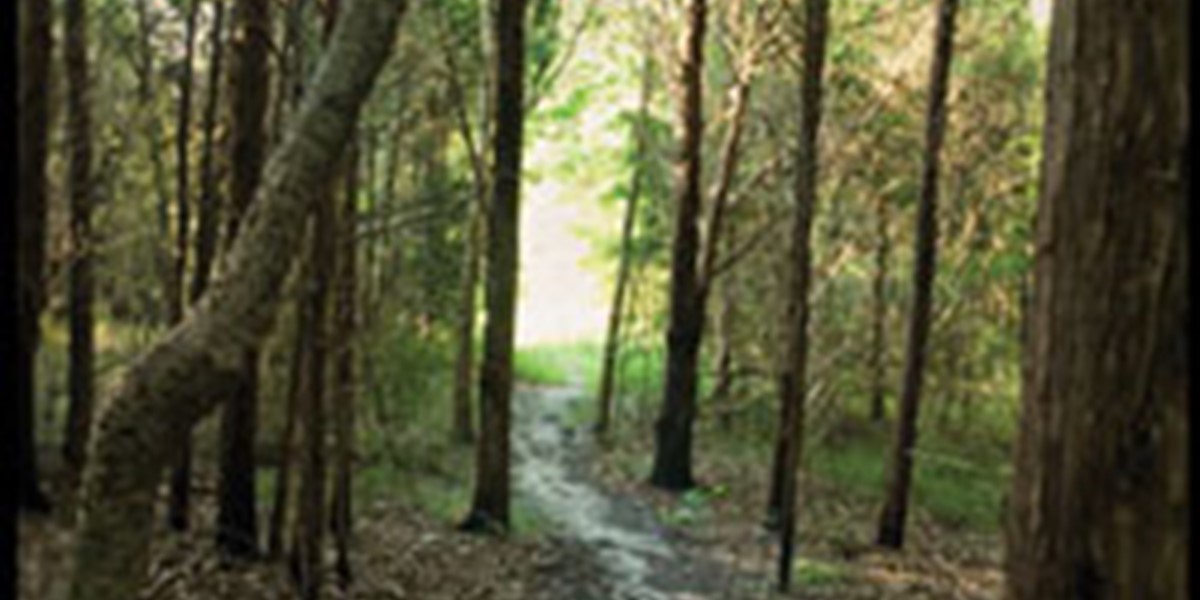
 D Magazine
D Magazine
Published April 1, 2011 By BILL HOLSTON
Introduction Paragraph By TIM ROGERS
Here’s another in our series of dispatches from the wilds of Dallas, written by our good friend Bill Holston. In today’s installment, he explains why a walk in the Trinity Forest motivated him to donate to the relief efforts in Japan.
Law Man Walking
By BILL HOLSTON
I recently returned to the Great Trinity Forest. This time I went on a field trip with my 2011 Master Naturalist class. I’m really enjoying getting to know people in this eclectic class. For an introvert like me, that’s a great comment on what an interesting group of people this is. To be honest, I really crave solitude, so it takes some getting used to, to spend time in nature with people. I’m really enjoying this, though. It’s fun to be in a group of life-long learners. On this venture, we were accompanied by Steve Houser, a local tree expert. Even though this was a return visit to the Buckeye Trail, for me it’s different every time, because of the changing seasons. This time, spring was in full evidence. In addition, because of the Master Naturalist Class, I’m learning to see the forest with entirely new eyes.
I arrived before anyone else and walked all of the trails. I had the entire place to myself. I quickly left the paved trail and headed across beautiful grass-lined dirt paths. I was gratified to realize that I can identify quite a few plants now, thanks to past hikes and the guidance of a very knowledgeable group of guides. I noticed that the bottomland was covered in luxuriant grasses, which I now know is a native Virginia rye, a cool-weather grass. In addition, there are clumps of lovely Inland Sea Oats, with their delicate stems, full of seeds for next year. I walked in the canopy of towering native pecans, cedar elms, cottonwoods, and past the eastern red cedars, which mostly stop at the forest edge. I walked past blooming dewberries, which always indicate disturbed soil, which in this case was the construction of the ADA-compliant trail. I remembered the ash leaf maple and its lovely green shoots of new growth.
I quickly made my way to the loop that enters the groves of buckeyes, which were still blooming. I walked over to the largest buckeye, which is on the banks of the Trinity River. I sat and took a water break. It was wonderfully quiet. There’s about a 20-foot bluff there, and I sat, watching the meander of the river. Soon, a Carolina wren perched in the brush just below me and began to sing. It’s a gloriously loud song for a really small bird. I smiled listening to the song. I pulled out my journal and started taking notes of all of the things I’d seen in this visit to the forest, realizing that slowly I was beginning to learn a few things, but there is so much more.
I pulled out the Psalms and read Psalm 137: “On the willows there, we hung up our harps, for our captors demanded of us songs.” The Psalmist is lamenting the exile of the Jews to Babylon, a time of national disaster. A few verses later, I read: “How can we sing the Lord’s song in a foreign land?” I remembered that my mother had written an essay about this Psalm, as she was dying of ovarian cancer.
My mom was a teacher. She ended her career teaching English as a second language. Many of her pupils were Japanese women whose husbands were here on business. It wound up being a really interesting time for my parents. During World War II, my father was a navigator on a B-24 bomber in the South Pacific. Let’s just say his view about Japanese people was not terribly enlightened. Actually, his view on most things was not terribly enlightened. It was pretty ironic that my parent’s house became full of Japanese people and the gracious gifts that they gave them. My dad eventually learned to get past some of his deeply engrained prejudices. He even became close friends with several of the students and their spouses. At the age of 68, my mom was diagnosed with stage IV ovarian cancer. In her essay about this Psalm, she recounted a story about a visit from Ms. Tosako, one of her former students. Ms. Tosako had actually returned to Japan. When she heard the news of my mom’s cancer, she called to say she was coming to visit. When she arrived at my mom’s house in Richardson, she presented her with a box. I’ll let my mom tell the rest of the story:
“Then I opened a large box with a present that I didn’t understand. There were 10 long streamers of brightly colored paper, tied together at one end by a pretty ribbon. She asked me if I knew what it was. Embarrassed, I admitted that it was not familiar to me. She smiled and replied, ‘This is a thousand-crane chain made for you by my family. With the making of each crane, we prayed to God to make you well. When we finished the chain, I knew it should be delivered to you by me, therefore I flew to America to bring it.’ It struck me that this was the greatest show of love ever extended to me.”
That still leaves me speechless. When I read my mom’s words, it reminds me of my connections to Japan. That country is in the middle of its own disaster. Reading this Psalm reminded me that I haven’t done anything about that. It’s about time I did.
I continued off on a side trail that leads past two enormous bur oaks. The trail was faint, but eventually ended where White Rock Creek enters the Trinity. I didn’t want to be late for the guided walk, so I walked out of the forest that day to join my Master Naturalist class. We heard a lecture by Steve Houser. Then the amazing Jim Flood walked us back through that forest. He pointed out the towering cottonwoods, laced with Virginia creeper, grapevines, and poison ivy. In our handout from Steve, we learned that a single acre of trees absorbs enough carbon dioxide to match that emitted by driving a car 26,000 miles. One acre of trees produces enough oxygen for 18 people every day. This forest is literally a life giver.
We walked on a sidewalk that Jim told us was hip deep in water during the rainy season, which is hard to imagine now as we are in the midst of a drought. Nature is apparently quite fickle. We struggle for water; Japan struggles with floods. I reflected on my connections with Japan. I thought about the kindness shown to my mother from a woman I do not know. I was left with a question: what should I do about that? By the time you read this, I’ll have answered that question.
